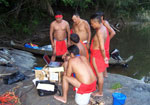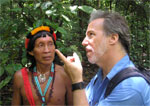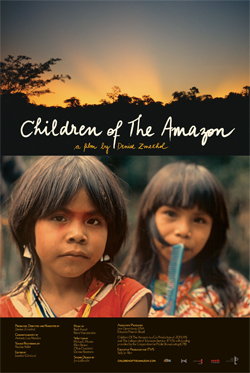‘Children of the Amazon’ looks at cultural loss of Amazon tribe confronted by deforestation
mongabay.com
October 5, 2008
|
|
‘Children of the Amazon’, a new documentary by Denise Zmekhol, looks at the cultural transformation of the Surui and Negarote tribes following the development and improvement of a highway that penetrates deep into the Amazon rainforest of western Brazil.
Zmekhol focuses on a group of Surui children she photographed 15 years ago to show the rapid cultural change that is occurring in indigenous communities at the frontier of development in the Brazilian Amazon. She illustrates the story through recent interviews with the children, who are now young adults; video shot of their village and the region in the late 1980s when colonists first started arriving in the region; archival footage of the Surui and Negarote tribes shortly after contact in the late 1960s; and the story of Chico Mendes, a rubber tapper union who was assassinated after famously battling ranchers and loggers in the late 1980s and laying the groundwork for the effort to save the Amazon rainforest. While the story is a depressing one for those who wish to see the Amazon conserved and the rights of indigenous people respected, ‘Children of the Amazon’ aims to end on an upbeat note by focusing on heroic efforts among the Surui to protect their forest homeland from developers — today the tribe is working with rubber tappers, innovative conservationists, and even Internet giant Google to preserve forests and its culture.
The premier, which took place at the Mill Valley Film Festival on October 5, was capped by appearances by Almir Surui, a Surui chief; Elenira Mendes,
the daughter of Chico Mendes; Vasco van Roosmalen, Brazil Program Director for the Amazon Conservation Team which is working with Chief Almir Surui to safeguard forest lands and Surui culture through the use of cutting-edge technology; and film-maker Denise Zmekhol. Chief Almir Surui was a day earlier recognized for his efforts to fight deforestation by San Francisco mayor Gavin Newsom who declared October 4th “Chief Almir Surui Day.”
At a reception following the film, Chief Almir Surui told mongabay.com that his tribe has faced a difficult struggle but that collaboration with the Amazon Conservation team, Google, and others has given the Surui new leverage against those who are trying to seize their lands and destroy their forests.
“The Surui know little about the Internet, but Google knows little about the forest, so working together we will be stronger,” he said. “We are mapping and monitoring our lands to protect our resources from loggers and ranchers.”
For more about ‘Children of the Amazon’, visit childrenoftheamazon.com.
Related articles
 |
An interview a shaman in the Amazon rainforest
(7/28/2008) Deep in the Suriname rainforest, an innovative conservation group is working with indigenous tribes to protect their forest home and culture using traditional knowledge combined with cutting-edge technology. The Amazon Conservation Team (ACT) is partnering with the Trio, an Amerindian group that lives in the remote Suriname-Brazil border area of South America, to develop programs to protect their forest home from illegal gold miners and encroachment, improve village health, and strengthen cultural ties between indigenous youths and elders at a time when such cultures are disappearing even faster than rainforests. In June 2008 mongabay.com visited the community of Kwamalasamutu in Suriname to see ACT’s programs in action. During the visit, Amasina, a Trio shaman who works with ACT, answered some questions about his role as a traditional healer in the village.
Amazon Conservation Team wins “Innovation in Conservation Award” for path-breaking work with Amazon tribes
(12/11/2007) The Amazon Conservation Team (ACT) was today awarded mongabay.com’s inaugural “Innovation in Conservation Award” for its path-breaking efforts to enable indigenous Amazonians to maintain ties to their history and cultural traditions while protecting their rainforest home from illegal loggers and miners.
 |
Amazon Indians use Google Earth, GPS to protect forest home
(11/14/2006) Deep in the most remote jungles of South America, Amazon Indians are using Google Earth, Global Positioning System (GPS) mapping, and other technologies to protect their fast-dwindling home. Tribes in Suriname, Brazil, and Colombia are combining their traditional knowledge of the rainforest with Western technology to conserve forests and maintain ties to their history and cultural traditions, which include profound knowledge of the forest ecosystem and medicinal plants. Helping them is the Amazon Conservation Team (ACT), a nonprofit organization working with indigenous people to conserve biodiversity, health, and culture in South American rainforests.
 |
Indians are key to rainforest conservation efforts says renowned ethnobotanist
(10/31/2006) Tropical rainforests house hundreds of thousands of species of plants, many of which hold promise for their compounds which can be used to ward off pests and fight human disease. No one understands the secrets of these plants better than indigenous shamans -medicine men and women – who have developed boundless knowledge of this library of flora for curing everything from foot rot to diabetes. But like the forests themselves, the knowledge of these botanical wizards is fast-disappearing due to deforestation and profound cultural transformation among younger generations. The combined loss of this knowledge and these forests irreplaceably impoverishes the world of cultural and biological diversity. Dr. Mark Plotkin, President of the non-profit Amazon Conservation Team, is working to stop this fate by partnering with indigenous people to conserve biodiversity, health, and culture in South American rainforests. Plotkin, a renowned ethnobotanist and accomplished author (Tales of a Shaman’s Apprentice, Medicine Quest) who was named one of Time Magazine’s environmental “Hero for the Planet,” has spent parts of the past 25 years living and working with shamans in Latin America. Through his experiences, Plotkin has concluded that conservation and the well-being of indigenous people are intrinsically linked — in forests inhabited by indigenous populations, you can’t have one without the other. Plotkin believes that existing conservation initiatives would be better-served by having more integration between indigenous populations and other forest preservation efforts.
